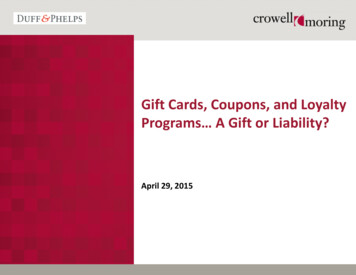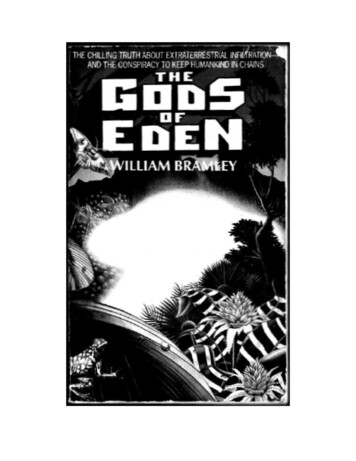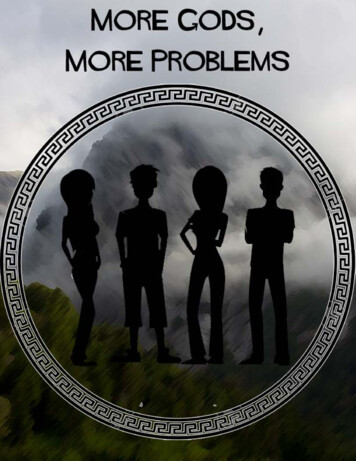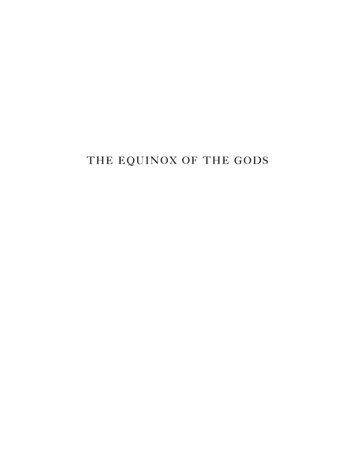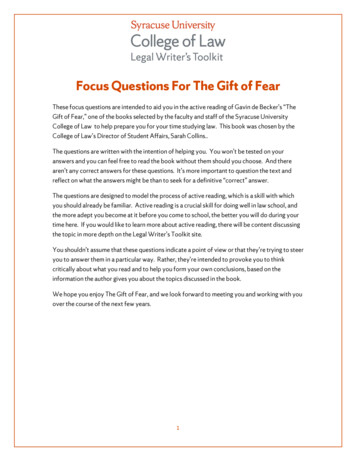
Transcription
THE GIFT OFTHE GODSA Study ofThe Historical DevelopmentofThe Doctrine of Eternal SecurityByHenry Shilling
The Gift of the GodsA Study of The Historical Development of The Doctrine o f EternalSecurityHenry Shilling2
(Please continue to the next page )3
Copyright, 1951THE FOUNTAIN PRESSFreesport, Pa.(Put on CD/PDF files by permission of publisher.)I therefore thank the publisher personally for theirkindness. All pages are numbered correctly with the exactinformation on them as appears in my copy of the book. In certainparts of this work I had to reduce the font size in order to get all thecontent on the same page. This includes the pictures but not thefancy bars. There is no editing of the spelling or grammar. It is asit appears within the book. I did so that any who research this workmay confidently quote from this work. The only addition to thiswork is the “TABLE OF CONTENTS” which I added to help expediteresearch.May God bless this information to the reader. May Godbless Rev. Shilling to our memory and to the continued work of ourLord and Savior.All rights reserved: no part of this book may be reproduced inany form without written permission from the Publisher, except by areviewer desiring to quote brief passages for inclusion in a notice tobe inserted in a newspaper or periodical.4
(Please continue to the next page )5
PREFACEThe Gift of the Gods is but a part of the large amount of materialavailable to the one who wishes it. That the basic concepts of thedoctrine of Eternal Security are pagan, not Christian is abundantlyevident. That the great Heart of God has given to a lost, bewilderedrace powerful concepts and strong language, concerning Hisfaithfulness and ability to save, is questioned by no one cognizant ofthe Bible. God's provisions to keep, His ability to keep, His desire tokeep us safe for Eternity is not open to debate by sensible people. Hismethod to accomplish this is the battle ground. How does He securethe soul from the ravages of eternal and timely forces that wouldseparate us from God? The Securitist answers by philosophicalreasonings. All of his contentions being interpreted by a philosophywhose roots lie in paganism.Anti-Eternal Securitists are usually more spiritually minded,less philosophically interested and more practical in their Biblicalapproach. They oppose to each other God and Devil, sin andholiness, spiritually and carnality, Scriptures and philosophy of men,right or wrong, supernatural and human, holy life and environment.They are "either-or" in their interpretation and experience of Godwhile the Securitists are "both-and" in these matters. Anti-Securitistsare "verticals" while Securitists are "horizontalists."6
The title, The Gift of the Gods is fitting. Eternal Security anchorsdeep in the great mud banks under the sea of pagan mythology,religion and philosophy. It sails under the flag of the Captain of theLord of Host, Jesus, but it carries contraband. Since there is a greatscarcity of ships to carry commerce of the skies to the hungry world,God has and does use some boats not very sea worthy for Hispurpose.Please bear in mind, reader, there is a world of differencebetween any particular Eternal Securitist and the Doctrine, orPhilosophy of Eternal Security. We are concerned entirely with thelatter in this book.} } }7
Table of ContentsChaptersPage1. Some Greek Mythology, Philosophy and History . 92. Some Persian Contributions .153. Manichean’s Contribution to the Gift of the Gods . 194. The Gift of the Gods . 225. Calvin’s Contribution to the Gift of the Gods . 526. A Chapter of Comparisons .597. Eternal Security - Eternal Speculation .678. The Gift of the Gods (same tile as 4, but with different materialcovered therein) . 749. A Comparison of Scripture Verses . 8110. Does Eternal Security Secure? . 11911. Securitists - Non-Securitists . 12412. Oil on Troubled Waters . 1308
Chapter ISOME GREEK MYTH OLOGY, PHILOSOPHY AND HISTORYAmong the many boons humanity has received from the gods most ofthem are gifts which have to do with physical comforts or advantageswhich have gone to make life on this terrestrial ball more bearable,pleasant and livable.When Prometheus spanned the gulf between the celestialworld and shivering man returning with that great sacred instrumentof the gods, fire, he suffered the fate of being chained by the angrydeities to a cliff where the birds of prey picked off his dying flesh, butmen have since, according to the story, been able to cook their food.When night gave birth to the Parcae, or the daughters ofnecessity, we have the germ of the "unbreakable chain of theSecuritists." Their ever running thread is partly spun and wound up,just drawn out and twisted, and partly on the distaff. Clotho, the onedaughter, holds the distaff and is ever furnishing the present; thesecond daughter, Lochesis, is spinning out the thread of life, layingout the future, while Atropos with the fatal scissors cuts it off,severing the past.9
The Parcae signify the power that governs as it were, from the dark,whose decrees are passed against which there is no resistance. Noticethis beautiful myth: it represents the thread of life, delicately spun, butthe thread never breaks; it is cut off by a superior power which hasirrevocably disposed of what men think they strive to accomplish intheir own way! Once a thread always a thread! The gods have spunit so!Again let us notice the dual aspect of Greek religion. Theyhad two classes or types of gods. The one was the good or holy gods;the other was the evil or earthly gods or demons. Both gods werepowerful, but when all went well they worshipped the Chathorian orearthly or evil gods. This duality of good and evil, this idea of goodgods and evil gods both having control of man's life is the germ ofthinking that later comes down to us as Security Theology.However we now have two distinct ideas from the Greekgods. One is that life is a thread woven by the gods. Once it is spuninto a thread it never breaks but ends only when cut off by thescissors, death. The other idea is that evil and good constantly liveside by side and the gods of both are to be placated! In Greek religionabsolutely no solution of sin is offered or sought! We live totallysubject to the will of both evil and good!These three contributions, the thread of life is woven by thegods and never breaks, we live with good and evil all our lives, andthere is no salvation from sin in this life are the contributions of theGreek10
mystery religion. Keep them clearly in mind!Now let us turn to Greek philosophy. The Greek mysteryreligions long held sway, but about the fifth century B. C. there arosean intellectual movement which produced philosophers. Thesephilosophers could not and did not accept Greek religion. One of thefirst complaints against it was polytheism. The philosophers inseeking the ultimate cause of all things demanded a single unitarycause. This of course interpreted by theology meant, monotheism one god, instead of polytheism-many gods.Another problem arose for the philosophers. Do the godsweave a predetermined pattern into life from a thread spun so that itnever breaks after the weaving has started? The Parcae, The Fates,or daughters of night, taught the Greeks that predestined Fate ruledman and that the gods elected each man to his fate, but now the Greekphilosophers call this into question.Still a third enigma presented itself to these men probing intothe secrets of man and God. Do the two forces of evil and good livesimultaneously, side by side in man, each demanding and getting hisshare of devotion and attention?For our present thought suffice it to say that the philosophersdecided that man's destiny was not determined by fate or the gods butby free choice. Concerning the first question, all their reasoningspointed to a single cause of all things. As for their third questionPlato seems to give the best answer since his answer later isChristianized into Eternal Secur-11
ity theology.Plato rejected the tenets of the mystery religions of his ownnation as they were promulgated, but his philosophical mind seizedon several propositions of these cults because they advocated throughthe means of deities metaphysical concepts which he felt needed to begiven thorough elucidation. Among these concepts was the problemof good and evil.Plato's interpretation of will has so impregnated the wholeChristian philosophical mind that to speak in non-platonic conceptsabout will one is marked immediately as heretic. Plato's solution ofthe problem of good and evil amounts practically to this: God intendsto form a perfect world, but he is hindered in doing so because thematerial he is obliged to use is imperfect. This imperfection isinherently in matter, and it is this matter o f which man and his worldare made. This is a basic error of much Christian philosophy sinceit is molded on Plato's error. Biblical basis for this concept iswanting. This also has become the fundamental tenet, arch stone, andessential plot for Eternal Security doctrine. The very word "Security"stands in juxtaposition to his concept of evil or imperfection. That is,Plato would argue that once good gets into man that "good" (not manhimself) is "eternally" good and can never be anything else than good.He would also argue that man himself (not "the good") is "secure"from being eternally doomed to the imperfection of matter.Plato also would argue that "eternal good" and man's soulwhich receives this eternal good are both12
now striving to form a perfect world, or in other words, to rise toPlato's World of Ideas, but in rising to this perfect world they arehindered by the fact that in addition to his having a soul, man also hasa body.This body is material, it is refractory, it is imperfect, it is, intheological terms, sinful. Plato would teach that the source of evil isthe body and sin is imperfection, that is, imperfection as compared tohis World of Ideas. Thus we have in Plato's problem of evil threethings to keep in mind and account for. The first is "The Good"comparable to our notion of God. The second is man's soul which hasreceived the good. The third is man's body, which is eternally evil.Here let us pause to make a comparison with Eternal Securityphilosophy. The Securitist's "Soul" is Plato's soul which has comeinto the knowledge of "The Good" by way of "acceptance." (AllSecuritists accept salvation, just as a philosopher accepts anyconcept.) The Securitist's body is Plato's refractory, imperfect matter,which now stands as the eternal hindrance to the eternal soul. Theeternal soul and "the eternal good" always are striving up to a perfectworld. The eternal body always hindering, always hampering, alwaysopposing, always striving to descend and drag the eternal soul downto the baser life. But because the "Eternal Good" is now in the eternalsoul, the eternal imperfect material of which the body is made cannottotally draw the soul into the eternal imperfection, or state of lost-13
ness.These three concepts of Plato are well illustrated by hischarioteer and the white and black winged horses. He illustrated thisidea by a man standing in a chariot drawn by these two horses. Onehorse always tried to mount upward as it went. This is Plato's "TheGood" or (God) ever drawing man heavenward. The black horse everdescended as it went drawing man downward. This is Plato's evil orsin. The man in the chariot is supposed to be him who has "accepted""The Good" or the white horse and harnessed it along with the blackhorse to his chariot or soul. To so drive these two steeds in such amanner that the charioteer "wins the race" is Plato's best concept ofthe result of accepting "The Good."Securitists have taken Plato's white horse, "The grace of God,"and Plato's black horse, sin, imperfection, evil, the body andharnessed these two steeds into the same chariot and started off toheaven. This theology is Platonic but not Christian. They arePlatonically "carrying the cross" because they refuse to unharness theblack horse. They are Platonically secure because Plato "being deadyet speaketh" to them. They are to be complimented in that they arelaboriously striving to get everyone into Plato's heaven but they areawakened to the fact that Jesus Christ operates no livery barn forblack stallions.Yes, verily, Eternal Security is the gift of the gods.14
Chapter IISOME PERSIAN CONTRIBUTIONSLet us take our leave of the Greek pantheon, paganphilosophers with their livery barns of white and black steeds andtake a look at another part of the world where other gods with pestleand mortar are mixing the alchemy of a nectar and ambrosia that wasto color the sweet stream of the well of salvation.In Persia we are to find some of the gods who graciously gaveof their time, belief, and attention to this gift, the subject of thisthesis.Here we find Ormuzd, the good spirit, engaged in eternalstruggle with Ahriman, the evil spirit, over the control of the world.In Plato's world "The Good" was not thought of as apersonality. Nor was "The Evil" thought of as a personality. To Platothey were philosophical entities and were not hypostatized, orpersonalized until human beings "accepted" them and enshrined themin human lives.We are now ready to take one step along our way toward theGift of the Gods when we enter the Persian religious world and find"The Good" being an actual personality, and "The Evil" being anactual personality.15
Philosophically, Eternal Securitists treat the whole economyof grace as a platonic ph
the body and sin is imperfection, that is, imperfection as compare d to his World of Ideas. Thus we have in Plato's problem of evil three things to keep in mind and account for. The first is "The Good" comparable to our notion of God. The second is man's soul which has received the good. The third is man's body, which is eternally evil.
